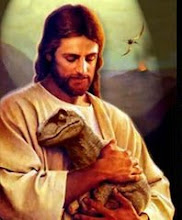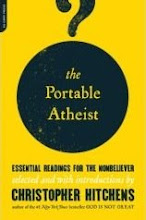Wednesday, November 12, 2008
Most damaging effect of the past 8 years
Thursday, October 9, 2008
Evolution in Action
http://news.nationalgeographic.com/news/2008/10/081007-super-worms.html
Saturday, September 13, 2008
John McCain and Sarah Palin are fucking retarded
Even Matt Damon is pissed.
As a bonus, John McCain was on The View the other day and there were some spectacularly awkward moments. Whoopi asked him if she should be worried about being put back in slavery. Classic. I love Whoopi!
Friday, September 12, 2008
Honor Killings
Wednesday, September 10, 2008
The Pew Study--what can it tell us about the rarity of the black atheist?
Being a black atheist can be an isolating experience at times. Of all the african americans I know myself and my partner are the only two atheists. The pew study on religion showed that 90% of people in historically black churches are absolutely certain that god exists (compared to 71% of the population at large). Additionally, 7% were 'pretty certain' that god exists while 0% classified themselves as atheists. Although the 0% is obviously not true it hints at just how rare black atheists are. Why are there so few of us out there?
The pew study has a very useful tool that allows for comparison of different religious groups and, somewhat unsurprisingly, african american church-goers rate very high with regards to regularity of church attendance (60% go at least once a week vs. 39% for the US at large). Additionally 85% (!) of african american church goers say religion is 'very important' in their lives compared to 56% of the population at large. It is easy to imagine that it is difficult to develop the independent thinking skills necessary for becoming an atheist with such a high level of consistant exposure. I've met many people in my life that are capable of asking the right questions and display a healthy level of skepticism but these flickers of skepticism never have a chance to grow into the seeds of atheism because the church life is the only one they know. I know that when I left home for college and gradually went to church less frequently I was able to separate myself from that particular lifestyle which was very important in my own personal journey. Many african americans are never in that position, even if they move away from home.
Daniel Dennet hit the nail on the head when he talked about 'belief in belief'. Basically, the idea is that people may not believe everything they say they believe with regards to their theological beliefs but that they believe in believing. I had a friend tell me recently that she was going to an ethics class where they were discussing the accuracy of the bible and she said 'well its just not in me to question it; it is what it is'. From her tone I gathered that, despite her skepticism in the bible, she was just not capable of challenging it. In my experience these types of attitudes are prevalent in the african american community and, considering the level of religious exposure african americans encounter, its easy to understand why.
Is it possible to toss off the shackles of religion when you are constantly exposed to it?
Article in Nature
We were perplexed by your Editorial on the work of the Templeton Foundation ('Templeton's legacy' Nature 454, 253-254; 2008). Surely science is about finding material explanations of the world -- explanations that can inspire those spooky feelings of awe, wonder and reverence in the hyper-evolved human brain.
Religion, on the other hand, is about humans thinking that awe, wonder and reverence are the clue to understanding a God-built Universe. (The same is true of religion's poor cousin, 'spirituality', which you slip into your Editorial rather as a creationist uses 'intelligent design'.) There is a fundamental conflict here, one that can never be reconciled until all religions cease making claims about the nature of reality.
The scientific study of religion is indeed full of big questions that need to be addressed, such as why belief in religion is negatively correlated with an acceptance of evolution. One could consider psychological studies of why humans are superstitious and believe impossible things, and comparative sociological studies of religion using materialist explanations of the rise and fall of the world's belief systems.
Perhaps the Templeton Foundation is thinking of funding such research. The outcome of such work, we predict, will not bring science and religion (or 'spirituality') any closer to one another. You suggest that science may bring about "advances in theological thinking". In reality, the only contribution that science can make to the ideas of religion is atheism.
Matthew Cobb and Jerry Coyne
Thursday, August 28, 2008
Fabulous article in Nature
Thursday, August 7, 2008
What is the root of the problem in modern religion?
Personally, I think the biggest issue is that in supernatural belief systems the truth is relative. The truth can be whatever you believe it to be. In this way, I think some belief systems rob the truth of its inherent meaning. This idea, for me anyway, defines the inherent problem with believing in the supernatural.
For example, if you want to believe that someone named Noah built an ark and put every animal on the planet in pairs on the boat to save them from a catastrophic flood then its perfectly acceptable and even encouraged. This is all despite the fact that this supposedly happened in the middle east somewhere although there is not a single shred of credible evidence to support it. Strange, considering how the middle east is among the most heavily archaeologically excavated areas in the world--so you'd think we would have found some piece of evidence in favor of it.
This example is fairly benign, but you can see how this type of logic would cause problems. How do people separate what they want to believe from what is actually true. What about when parents believe that vaccines are dangerous and cause autism, despite the evidence to the contrary, and don't get their kids vaccinated and start a measles outbreak in their community? What about when policymakers block funding for stem cell research simply because they believe that zygotes have souls...despite the complete lack of evidence that souls even exist.
Thursday, July 31, 2008
Interesting Topic--Evolution of Snake Fangs
Monday, July 7, 2008
Do scientists have faith?
In order to address this issue I think it is important to first define what is meant by faith. An appropriate definition of faith is ‘belief in the absence of evidence’. 2 Corinthians 5:7 says ‘we walk by faith and not by sight.’ Even in the bible itself faith is defined as the opposite of ‘sight’, or evidence. In contrast, our entire scientific understanding of the world is based on interpretations of experimental evidence. Our theories are frameworks which allow us to give context to the evidence we find. From this definition of faith it is painfully clear that scientists lack faith.
However, some choose to define faith as merely a belief in an idea. In this context, scientists do have faith. But even with this superficial definition, there would be clear differences between scientific and religious faith. Ask yourself—“Why do you believe what you believe?” The Christian answer is simple—they would say I believe because I have faith. In other words, their belief rests on unprovable propositions and not evidence.
The scientists answer is also simple—they would say I believe because I have seen the evidence and it is compelling, significant and repeatable. The two approaches are fundamentally different. Religious faith rests on belief that is spared the requirements of evidence. Scientific knowledge is entirely and utterly dependant on evidence. Without adequate evidence scientific theories fail.
In conversations with religious people it is apparent that one condition of their faith is that, no matter what the evidence to the contrary, they will not change their beliefs. No matter how much evidence we have that proves evolution, a creationist they will never change their mind that god created the earth and all its creatures. Again, we can draw a contrast with the scientific approach, which is reliant on new evidence. Without new evidence, we would still believe the earth was the center of the universe and that diseases were caused by evil spirits trying to inflict harm on us. In fact, if there were new and compelling evidence that completely dismantled the theory of evolution, most scientists would accept the data and amend (or discard) the theory.
Faith could be defined as belief without evidence or simply belief itself but, regardless of the definition, scientists do not have faith. The whole scientific enterprise is dependant on evidence and reason while religious doctrine would collapse under such rigorous requirements.
Friday, June 27, 2008
The best idea anyone has every had about anything ever.
In a religious context, 'faith' and 'truth' are almost synonyms. And faith is automatically good. If an idea is considered truth in your religion, and you don't have faith in it, that's a reflection on your failure as a faith-holder rather than the idea's failure to be true. If you don't have enough faith on a given subject, you should work harder at it.
In the sciences, that kind of faith is not a virtue; it's a personal failing. Imagine a bridge engineer being invited to "have more faith" that a design has enough steel in it to keep his bridge from collapsing. His faith has nothing to do with it; either the bridge stays up, or it falls down. Faith in the sense of 'letting yourself be persuaded without adequate evidence' is morally wrong in that context. If the bridge engineer does so, and people die in the collapse, he's murdered them.
Scientists, or the good ones, feel the same way about their theories that good engineers feel about their bridges. It's their job to make them right, not to convince themselves for their own emotional comfort that they're already right, pretty much, close enough.
If a scientist says "I have faith this theory is true," he doesn't or shouldn't mean it in the religious sense of "I commit myself to this no matter what the evidence may say, forever. Don't try to change my mind, here I stand."
Instead, he means or ought to mean "I've tested this theory, and I've seen the results of other people's tests, and I'm as sure as I can possibly get on the available evidence that this theory is as close to right as we can get. Unless something else really radical turns up. Keep me posted."
I think it is absolutely phenomenal. One of my favorite posts on any forum I've read online.
Monday, June 23, 2008
Why are religious dogmas so utterly.... vague??
Notes on Stupidity
Sunday, June 15, 2008
Is religion dangerous?
I think that recognizing the horrendous acts that the “godly” have committed over the years based on the tenets of their respective dogmas is important—especially when discussing the dangers of faith. However, because very few people today have experienced those atrocities firsthand, I think the point often gets lost.
Here are several tangible examples of the dangers of religion on both an individual and social level:
1. Faith and Federal Policy: Several recent polls show that 40-60% of Americans believe Jesus Christ will return at sometime within the next fifty years. This figure is absolutely astonishing. What this means is that there are 200 million of our neighbors and fellow citizens who think that the apocalypse will occur at some point within the next fifty years. This statistic should alarm any person who is even remotely aware of the potential harm this mindset can cause as we, as a nation, are confronted with very complicated modern problems.
How do we tackle problems like global warming that require long-term solutions when half of us do not even believe there will be anything to save? We simply cannot create efficient and durable environmental policies when most of us are expecting the world to end. Perhaps the problem with this way of thinking is best illustrated by Ronald Reagan’s Secretary of the Interior, James G. Watt, who said “We don’t have to protect the environment, the Second Coming is at hand.”
This type of thinking also pervades our foreign policy. It is virtually impossible to craft effective long-term foreign policies with countries in the Middle East and Asia when those people are considered, by any biblical definition, to be heretics, non-believers and blasphemers. Religious dogma is clearly incompatible and incredibly dangerous in a global society where we must learn to put aside our differences and work diplomatically toward solutions.
2.Seeking Counsel in Clergyman: In my experience, this is especially prevalent within the African-American Christian community. Black churches across America teach their parishioners that when they experience an incredibly tragic event, don’t go to a therapist, but seek refuse in God—which usually means talking to the clergymen. The problem with this is that most church leaders are ill-equipped to counsel someone through complex emotional and personal issues. It is undeniable that attempting to help someone through an issue from the perspective of first century superstition and scripture is incredibly limited and potentially dangerous. I know someone who found several family members brutally murdered in their home, yet instead of hiring licensed therapist, this person pushed more deeply into church. They would often say, “God will get me through this.” Well it has been four years and they are still waiting on God.
Even in less extreme situations that confront most people like divorce or financial woes, there seems to be an ardent refusal among conservative Christians in our community to utilize the resources that exist outside the church for appropriately managing these situations.
3.Faith Fixes Everything: The fundamental problem with a belief in a supreme, omnipotent, omnipresent being is that this mindset completely undermines the responsibility that we , as individuals, have to take care of ourselves by making responsible decisions. How is one supposed to take full personal responsibility in a situation when they believe that God has already figured out exactly what’s going to happen?
People who honestly believe that ‘God will make a way can make potentially disastrous decisions without considering the full consequences—because they believe ‘the power of prayer’ will intercede to create the outcome that they desire. Applying this mindset to life’s important decisions is like jumping off a cliff and thinking that God will put out a safety net ‘just in time.’
In closing, it has become increasingly obvious to me that there are modern issues we are dealing with that will require enormous cooperation and foresight, and religious dogma is clearly an impediment to these goals. In addition to affecting our federal policies, religious dogma is destructive at the personal level because it offers people false hope in dealing with personal issues and it encourages them that they can do whatever they want to because God will ‘make a way’. I can only hope we realize how dangerous religious dogma is before it is too late.
Monday, June 9, 2008
Does a belief God give us morality?
Two of the most common arguments in favor of the existence of God—or against atheism— are: 1. God gives us morality, 2. without religion people would be immoral. These arguments, which are essentially one in the same, are illogical and ill-informed on several counts. Nonetheless, this type of thinking permeates so much of our culture. We can approach, and subsequently debunk, this argument somewhat scientifically:
1)One popular assumption is that the “godless” are less moral than those who believe in God. If we use propensity to commit crime as a measure of moral health, you would expect that there would be a high ratio of atheists in prison. But studies have shown that at least 80% of people in US prisons define themselves as religious: 50% as Baptist or Catholic, and roughly 30% claim to have a religious preference but do not specify a specific religion or denomination. Additionally, if morality was a byproduct of a belief in God, than states with a high number of believers would conceivably have lower rates of crime than those that are comparably more secular. But this is also entirely untrue. SC ,Tenn, Tex, Louisiana and Georgia all rank among the top 10 in terms of crime rates, and these states are the heart of the Bible Belt...but if there are so many believers then why do these places have the highest rates of crime? The point is if we use crime rates as a metric, a high degree of religiosity does not correlate with morality, which is exactly what you would expect if religion or a belief in God were the bedrock of our sense of morality.
2) What about Hitler? Theists just love to point out that the mass murderers of the 20th century (Hitler, Stalin, etc) were all atheists, which proves atheists are evil and cannot be trusted in positions of power. Again, this view is not based in the facts. Hitler's ideology contained both pro- and anti-religious doctrines and dogmas so at the very least his religiosity is inconclusive. On one hand, he speaks about carrying out 'His' (God’s) will in exterminating the Jews and the importance of prayer. On the other hand, he speaks of maintaining the superiority of the state over the church. Beyond that, anyone who has ever read the Bible knows it provides ample anti-Semitic ideology. Not surprisingly, anti-Semitism in Germany was biblically based and these ideas were prevalent in German society well before Hitler ever came to power. My point is that, despite Hitler's religious ambiguity, anti-Semitism would never have been tolerated if not for its biblical roots.
Stalin was a self-affirming atheist but he does not support the conclusion that atheism leads to moral decay since he never killed anyone because of his atheism. Compare that to murderers that are clearly motivated by their religion—Timothy McVeigh, the September 11th martyrs, abortion clinic bombers, etc. Who could dispute that, but for a belief in the afterlife and the ideas of martyrdom, Islamic terrorists would lose most of their destructive motivation? Who could deny that religious ideology has been the root cause of innumerable conflicts in modern times?
3) More recently, scientists have begun studying what underlies morality. They’ve found that regardless of social class, religious upbringing, or country of origin, people have similar basic principals regarding morality. Additionally, specific areas of the brain are activated in response to moral questions. Collectively, these studies suggest that our sense of morality is innate and, therefore, independent of religious background. If our morality is not dependant on religion then where does it come from? Although the jury is still out, there is evidence of morality in animals. One study demonstrated that a chimpanzee will starve itself in order to prevent harm to another chimp and studies from behavioral biology clearly demonstrate that social primate societies are intolerant of rape or theft. This is obvious evidence of morality among creatures that completely lack the capacity to believe in God.
From the examples above, it is clear that being religious and believing in God does not correlate in any way with social health or general morality. Furthermore, scientists are beginning to understand where our morality comes from and it is clear from the work done thus far that our sense of right and wrong has roots in our evolutionary past--not a system of beliefs and ideologies invented merely 2000 years ago.
Wednesday, June 4, 2008
How did I get here?
Tuesday, June 3, 2008
What is an atheist?
A lot of people hear the word atheist and have a negative knee-jerk reaction. They think of god-less and soul-less heathens with no morals. I can almost hear the negative tone: How can you even imagine that god does not exist? How do you know what is right and wrong? How did we get here? If there is no god, then what is our purpose in life?
It always confuses me because, for one, I consider myself a good person. I dont steal. I dont cheat. I work hard. I am very well-educated and well-read. I love the people around me and work hard to become a better person. The atheists I know all generally fall into the same category.
My personal definition of an atheist is a person who rejects the supernatural. That includes god(s), angels, demons, 'hellhounds', djinns and ghosts. (and leprechauns, santa claus, the easter bunny, etc.) Atheists also tend to be rationalists, which means they seek a rational, logical explanation for basing their particular worldview.
Atheism itself is NOT a dogma. It is NOT a religion. There are no rules to follow to be a proper atheist. That does not mean atheists have no moral code. If there were a universal atheistic moral code I suppose it would be something along the lines of "I shall seek to cause no harm to fellow humans, accept responsibilty if/when I do cause harm and attempt to diminish human suffering." Atheism is something of a secular philosophy of life that does not invoke or require supernatural agents.
I am not writing this blog to try to convert anyone to atheism, I am writing this blog for several reasons: to express my opinions about the various intersections between religion, society, politics, science and morality and to start conversations about issues concerning those subjects. The other motivation for writing this blog is that, despite the 'new atheist' movement of the 21st century, the opinions of the minority atheist community are conspicuously absent. This blog is my attempt to contribute something to this movement which, if recent polls are any indication, is only growing.
.jpg)


